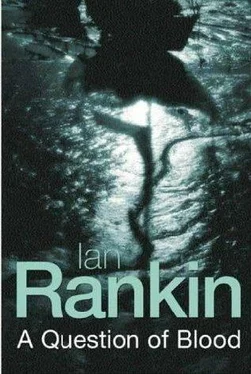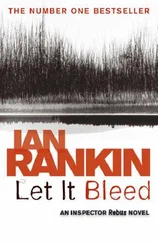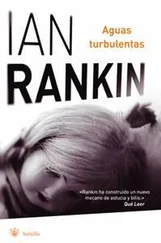That evening, she settled down on her sofa, trying to get interested in anything on TV. Two gaudily dressed hosts were telling their victim that her clothes were all wrong for her. On another channel, a house was being “decluttered.” Which left Siobhan the choice of a gray-looking film, a dreary comedy series, or a documentary about cane toads.
All of which served her right for not bothering to stop off at the video shop. Her own collection of films was small-“select,” as she preferred to call it. She’d watched each one half a dozen times at least, could recite dialogue, knew exactly what was coming in every scene. Maybe she would put some music on, turn the TV to mute and invent her own script for the boring-looking film. Or even for the cane toads. She’d already skimmed a magazine, picked up a book and put it down again, eaten the crisps and chocolate she’d bought at the garage when she’d stopped for petrol. There was a half-finished chow mein on the kitchen table, which she might get around to microwaving. Worst of all, she’d run out of wine, nothing in the flat but empty bottles awaiting the recycling run. She had gin in the cupboard, but nothing to mix it with except Diet Coke, and she wasn’t that desperate.
Not yet, anyway.
There were friends she could phone, but she knew she wouldn’t make great company. There was a message on her answering machine from her friend Caroline, asking if she fancied a drink. Blond and petite, Caroline always attracted attention when the two of them went out together. Siobhan had decided not to return the call just yet. She was too tired, with the case buzzing around her head, refusing to leave her alone. She’d made herself coffee, taking a mouthful before realizing she hadn’t boiled the kettle. Then she’d spent a couple of minutes searching the kitchen for sugar before remembering she didn’t take sugar. Hadn’t taken it in coffee since she’d been a teenager.
“Senile dementia,” she’d muttered aloud. “And talking to yourself: another symptom.”
Chocolate and crisps weren’t on her panic-free diet. Salt, fat and sugar. Her heart wasn’t exactly racing, but she knew she had to calm down somehow, had to relax and start winding down as bedtime approached. She’d stared out of her window for a while, checking on the neighbors across the street, pressing her nose to the glass as she looked down two stories to the passing traffic. It was quiet outside, quiet and dark, the pavement picked out by orange streetlamps. There were no bogeymen; nothing to be scared of.
She remembered that a long time ago, back in the days when she’d still taken sugar in her coffee, she’d been afraid of the dark for a while. About the age of thirteen or fourteen: too old to confide in her parents. She would spend her pocket money on batteries for the flashlight she kept on all night, keeping it beneath the covers with her, holding her breath in an attempt to pick out the breathing of anyone else in the room. The few times her parents caught her, they just thought she was staying up late to read. She could never be sure which was the right thing to do: leave the door open, so you could make a run for it, or close it to keep out intruders? She checked beneath her bed two or three times each day, though there was little enough room under there: it was where she stored her albums. The thing was, she never had nightmares. When she did eventually drop off to sleep, that sleep was deep and cleansing. She never suffered panic attacks. And eventually she forgot why she’d ever been afraid in the first place. The flashlight went back in its drawer. The money she’d been wasting on batteries she now started spending on makeup.
She could never be sure which came first: did she discover boys, or did they discover her?
“Ancient history, girl,” she told herself now. There were no bogeymen out there, but precious few knights either, tarnished or otherwise. She walked over to her dining table, looked at her notes on the case. They were laid out in no order whatsoever-everything she’d been given that first day. Reports, autopsy and forensics, photos of crime scene and victims. She studied the two faces, Derek Renshaw and Anthony Jarvies. Both were handsome, in a bland sort of way. There was a haughty intelligence to Jarvies’s heavy-lidded stare. Renshaw looked a lot less sure of himself. Maybe it was a class thing, Jarvies’s breeding showing through. She reckoned Allan Renshaw would have been proud of the fact that his son boasted a judge’s son as a friend. It was why you sent your kids to private school, wasn’t it? You wanted them to meet the right sort of people, people who might prove useful in the future. She knew fellow officers, not all of them on CID salaries, who scrimped to send their offspring to the kind of schools they themselves had never been offered the chance of. The class thing again. She wondered about Lee Herdman. He’d been in the army, the SAS… ordered about by officers who’d been to the right schools, who spoke the right way. Could it be as simple as that? Could his attack have been motivated by nothing more than bitter envy of an elite?
There’s no mystery… Remembering her own words to Rebus, she laughed out loud. If there was no mystery, what was she worrying about? Why was she slogging her guts out? What was to stop her putting it all to one side and relaxing?
“Bugger it,” she said, sitting down at the table, pushing away the paperwork and pulling Derek Renshaw’s laptop towards her. She booted it up, plugging it in to her phone line. There were e-mails to be gone through, enough to keep her awake half the night if need be. Plenty of other files, too, that she hadn’t checked yet. She knew the work would calm her. It would calm her because it was work.
She decided on some decaf, this time remembering to turn the kettle on. Took the hot drink to the living room. The password “Miles” got her online, but the new e-mails were junk. People trying to sell insurance or Viagra to someone they couldn’t know was dead. There were a few messages from people who’d noted Derek’s absence from various bulletin boards and chat rooms. Siobhan thought of something and dragged the icon to the top of the screen, clicking on “Favorite Places.” Up came a list of sites, shortcuts to addresses Derek had used regularly. The chat rooms and bulletin boards were there, along with the usual suspects: Amazon, BBC, Ask Jeeves… But one address was unfamiliar. Siobhan clicked on it. Connection took only a few moments.
WELCOME TO MY DARKNESS!
The words were in dull red, the color pulsing with life. The rest of the screen was a blank background. Siobhan moved the cursor onto the letter W and double-clicked. Connection took a little longer this time, the screen changing to a picture of a room’s interior. The image was fairly indistinct. She tried altering the screen’s contrast and brightness, but the problem was with the image itself, there was little she could do to improve it. She could make out a bed and a curtained window behind it. She tried moving the cursor around the screen, but there was no hidden marker for her to click on. This was all there was. She was sitting back, arms folded, wondering what it might mean, wondering what interest the image could have had for Derek Renshaw. Maybe it was his room. Maybe the “darkness” was another side to his character. Then the screen changed, a strange yellow light passing across it. Interference of some kind? Siobhan sat forwards, grasping the edge of her table. She knew what it was now. It was a car’s headlights, brief illumination from behind the curtains. Not a picture then, not a captured still.
“Webcam,” she whispered. She was watching a real-time broadcast of somebody’s bedroom. Moreover, she knew now whose bedroom it was. Those headlights had done just enough. She got up, found her telephone and made the call.
Читать дальше












